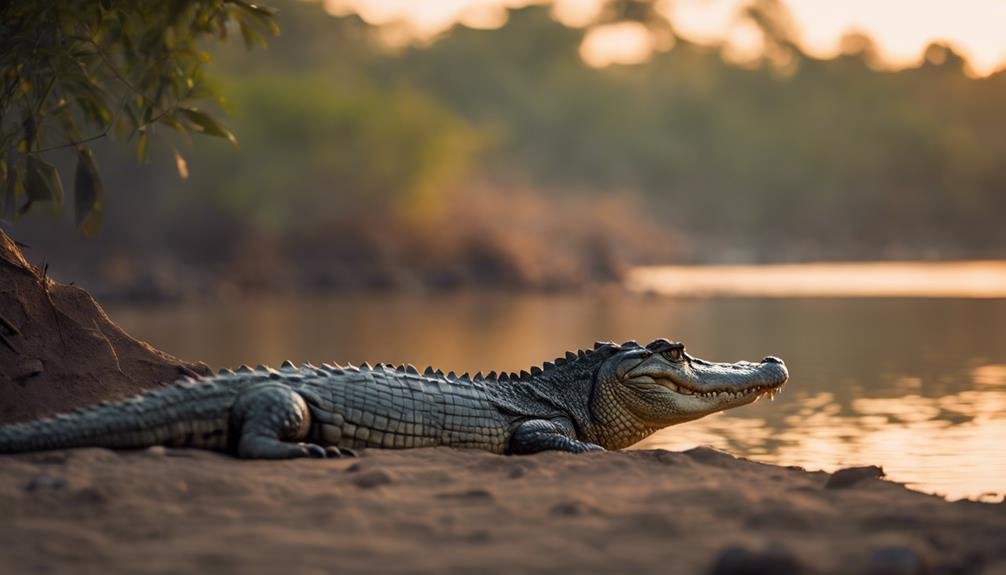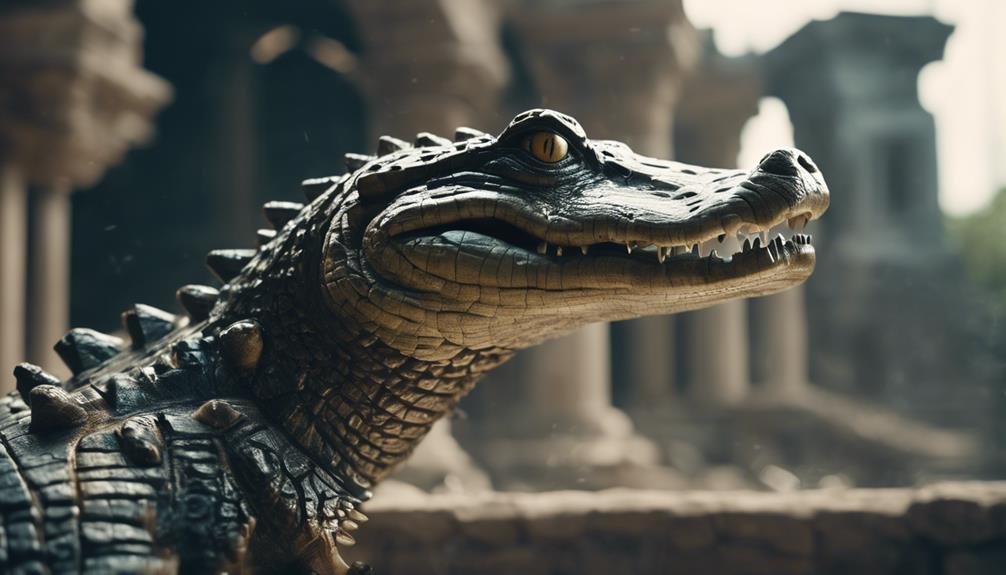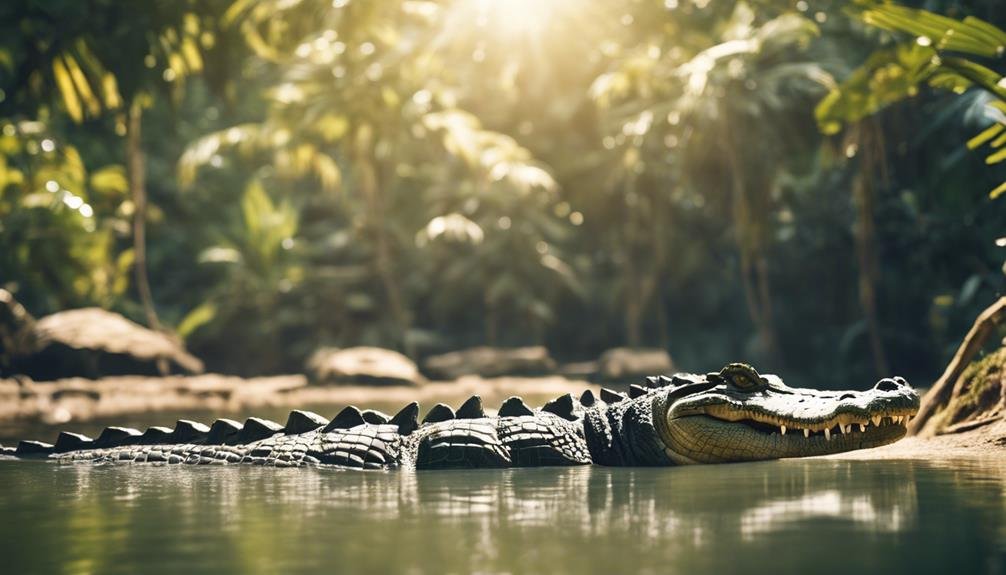You've likely heard tales of crocodiles' near-immortal status, creatures that defy the usual marks of time with their impressive longevity. Yet, as you explore the reality behind these ancient reptiles, you'll find that they're not exempt from the laws of nature. Despite living up to 70 years or more, crocodiles do show signs of aging and, indeed, can die of old age. But what's fascinating is the research focusing on their unique characteristics, such as negligible senescence and the ability to survive in extreme conditions, which might reveal secrets to extending human life. So, let's consider what truly makes these ancient predators tick, and perhaps, uncover what their existence can teach us about our own pursuit of longevity.
Key Takeaways
- Crocodiles show signs of aging such as cataracts and reduced fertility, indicating they can age.
- Despite negligible senescence, crocodiles do not live forever and can die of old age.
- Life expectancy for saltwater crocodiles in the wild can reach around 70 years.
- Diseases, environmental stress, and accidents can also contribute to a crocodile's death.
- The myth of crocodile immortality is debunked by their finite lifespan and visible aging signs.
Understanding Negligible Senescence
Negligible senescence in crocodiles means they don't show the typical signs of aging, enabling them to maintain their vigor and functions as they grow older. This fascinating trait means that, unlike humans and many other animals, crocodiles don't experience a decline in their physical or reproductive abilities over time. They continue to grow throughout their lives, a clear sign of their negligible senescence. This continuous growth isn't just for show; it's a key factor in their survival, allowing them to adapt and thrive in various environments.
Moreover, crocodiles possess an incredible ability to survive without oxygen for extended periods. This adaptation isn't just a neat party trick; it's indicative of their overall resilience and a reflection of their evolutionary success. It's one of the reasons they've been around for millions of years and continue to dominate aquatic ecosystems.
In essence, negligible senescence enables these ancient reptiles to live without the common constraints of aging. They don't just survive; they thrive, growing stronger and more formidable with age. This ability to survive without succumbing to the typical signs of aging is what sets crocodiles apart in the natural world, making them a subject of both awe and scientific curiosity.
Crocodile Longevity Explained
Despite their remarkable resilience, crocodiles do eventually show signs of aging, such as cataracts and reduced fertility, challenging the myth of their immortality. Their life expectancy, particularly in wild saltwater crocodiles, can reach around 70 years, reflecting their impressive longevity. This extended lifespan is partly due to their ability to continue to grow throughout their lives, a trait not seen in most other species.
Crocodiles exhibit negligible senescence, meaning they don't show the typical functional decline with age that you'd expect in living beings. This unique biological feature means they maintain vitality and health far longer than many other creatures, contributing to their long life expectancy. Their bodies have adapted in extraordinary ways to support this longevity, including surviving without oxygen for over two hours, thanks to hypometabolism and protective proteins that support survival in anoxia conditions.
However, despite these remarkable adaptations, they aren't immune to the effects of old age. While they may not decline functionally as they age, physical signs of aging, like cataracts and reduced fertility, do appear, debunking any myths of crocodile immortality.
Factors Affecting Crocodile Lifespan


Several factors, including disease, accidents, and starvation, can greatly shorten a crocodile's lifespan. Despite the remarkable longevity crocodiles can achieve, their lives in the wild or in captivity are fraught with challenges that could end their journey prematurely. You mightn't know, but even the largest captive crocodile had its days numbered due to factors beyond just age.
To keep you intrigued, here are three important elements that impact how long these ancient reptiles can live:
- Disease and Health Issues: Just like humans, crocodiles face health challenges as they age. Signs of aging, such as cataracts and weakening, can make them more susceptible to diseases, affecting their overall lifespan.
- Environmental Stress: Stress, especially in captivity, can significantly influence a crocodile's growth rate and longevity. Factors like inadequate space, poor diet, and unnatural living conditions can contribute to stress.
- Accidents and Predation: While crocodiles sit high up the food chain, they're not invulnerable. Young crocodiles, in particular, are at risk from predators and accidents, which can greatly reduce their chances of reaching old age.
Understanding these factors gives us insight into the challenges crocodiles face in achieving their impressive longevity.
Myths of Crocodile Immortality
Many people mistakenly believe that crocodiles can live forever, a myth that science has thoroughly debunked. Dr. Michio Kaku, a prominent physicist, clarified that while crocodiles don't possess eternal life, they can grow continuously throughout their existence. This unique ability might've fueled the myth of their immortality. However, it's important to understand that growing and living forever aren't the same. Crocodiles, like all living beings, have a finite lifespan and show clear signs of aging such as cataracts, weakening of their bodies, and limited fertility as they get old.
The misconception of crocodile immortality also overlooks the fact that these ancient reptiles can die from factors other than old age. Despite being among the world's largest and most formidable predators, their longevity doesn't equate to immortality. They live long lives, yes, but eventually, they succumb to the natural aging process or other factors affecting their survival. Dispelling the myth of their immortality helps us appreciate the true nature of these fascinating creatures and the biological principles that govern all life on Earth.
Research and Future Insights


Exploring the remarkable longevity of crocodiles, researchers are delving into the secrets of their minimal aging process, aiming to reveal potential breakthroughs in human anti-aging treatments. The focus isn't just on their scaly skin or the fact that crocodiles simply grow indefinitely, but on the cellular and genetic mechanisms that could reveal new paths for extending human life.
Here are three key insights intriguing researchers and audiences alike:
- Negligible Senescence in Crocodiles: Unlike humans, crocodiles display negligible senescence, meaning they don't show typical signs of aging. This trait is at the center of current research, with the goal of understanding how to slow down the human aging process.
- Innovative Approaches in Longevity Research: Organizations like the SENS Foundation are pioneering efforts in regenerative research. By studying crocodiles and other organisms, they're exploring ways to reprogram human cells, potentially postponing aging.
- Oxygen Deprivation Survival: Crocodiles' ability to survive without oxygen for extended periods links to their longevity. This unique trait is sparking research into how similar mechanisms might be applied to protect human cells during health crises.
Are Crocodiles Considered Immortal Due to Their Scales?
Crocodiles’ scales facts & misconceptions abound regarding their supposed immortality. While their tough and durable scales offer protection against predators, they do not grant eternal life. Crocodiles can, however, live long lives due to their natural resilience and adaptability. Their scales play a crucial role in their survival, but their lifespan is finite like any other creature.
Frequently Asked Questions
Can Crocodiles Die of Old Age?
You might wonder if crocodiles can die of old age. While they show aging signs like cataracts and reduced fertility, these ancient reptiles don't perish from old age in the same way humans do.
Their lifespan, especially in captive care, is influenced by factors like crocodile diseases and environmental conditions rather than aging itself.
In essence, crocodiles remain robust with age, defying the typical senescence seen in other species.
Can a Crocodile Live to 120 Years?
Yes, a crocodile can live up to 120 years, especially in captivity where factors like habitat impact and diet variety are controlled.
Your crocodile's growth rate plays an important role, too. With a balanced diet and a safe environment, these ancient reptiles often outlive their wild counterparts.
They don't quite dodge aging, but they do show us that under the right conditions, they can reach impressive ages, touching the 120-year mark.
What Is the Maximum Age of a Crocodile?
The maximum age of a crocodile can vary widely, influenced by factors such as growth patterns, habitat impact, and conservation efforts.
In the wild, saltwater crocodiles might live up to 70 years, while freshwater species often reach between 40 to 60 years. However, in captivity, with excellent care, they've been known to live even longer, suggesting they could reach up to 100-120 years.
These long lifespans highlight their remarkable resilience and adaptability.
What's the Oldest a Crocodile Can Live?
You're probably wondering how old a crocodile can get. Well, it's not just about the years; growth rates, habitat impact, and diet diversity all play important roles.
Saltwater crocs can hit 70, while their freshwater cousins range between 40 to 60. In captivity, they might push to 100-120, thanks to controlled conditions.
Yes, these ancient reptiles do age, and their lifestyle greatly influences their longevity.
Conclusion
So, there you have it. While crocodiles are renowned for their remarkable longevity and seemingly ageless vitality, they're not immortal. Aging does catch up with them, influenced by disease, environmental stress, and more.
The myths surrounding their immortality are just that—myths. Yet, their unique traits offer a window into potentially groundbreaking anti-aging research. As we continue to study these ancient reptiles, we might just uncover secrets that could extend human life, making their story even more fascinating.


